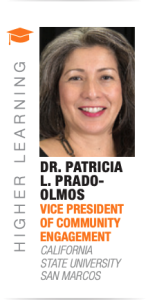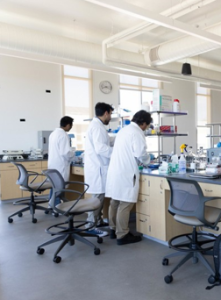CSUSM’s new infinity lab offers incubator to biotech startups

When Thomas Lyle Temple began searching for lab space to house his biotech start- up, he wasn’t exactly enamored with his options.
Temple toured private facilities in the region that failed to meet his expectations in multiple ways – whether the culprit was age, accumu- lated dust or debris. And for the privilege of occupying such a space, the going rate was $10,000 a month or more.

What a pleasant change it was for Temple, then, when his nascent company’s head of business devel- opment told him about a new opportunity to rent room in Cal State San Marcos’ Ex- tended Learning building. The bright and modern lab on the fourth floor marked such a sharp contrast to what he had been seeing, a tissue culture room for culturing cells and an impressive collection of the type of equipment any biotech startup would require. Space can be rented by the linear foot. The lab can accommodate three to five companies at a time, and re- newable leases are for six-month terms, as befits a lab that considers itself a bio- tech incubator.
“The idea would be to not have companies in for over two years,”Galasso said. “With- in two years, you should be growing enough that you need to go somewhere else.”
Because of its university affiliation, a requirement of the Infinity Lab is that students benefit from any industry partnership. That can take multiple forms, from students being hired as interns, to companies hosting classes in the lab to tell their story, to bio- tech entrepreneurs speaking on campus in a casual, roundtable style.
Grann, for example, has brought aboard two CSUSM master’s students as interns for the upcoming school year, and the students will learn Grann’s process of re-expressing proteins using mRNA lipid nanoparticle that he accepted on the spot.
“It’s been wonderful,” Temple said. “This lab space is incredibly nice.”
Temple is the president and CEO of Grann Pharmaceuticals, a biotech that he formed with several classmates while they were still students at Whittier College. This spring, before they even had graduated, Grann moved into the Infinity Lab, a state-of-the- art research facility in the Extended Learning building. In mid-July, Grann was joined in the lab by a second client: Alcheme Bio, a small startup founded by Vanessa Small, a member of the advisory council for CSUSM’s College of Science, Technology, Engineering, and Mathematics.
The Infinity Lab was designed as a teaching space, but partly because of the pandemic, it hasn’t been used for that purpose since the building opened four years ago. In 2020, CSUSM initiated an ex- periment to reimagine the lab by leasing space to cancer diagnostics company Volition, which stayed for about a year before moving on.
Now, CSUSM is doubling down on the growth of its innovation ecosystem. Debora Galasso, a 25-year veteran of the biotech in- dustry and CSUSM lecturer, has been recruit- ed to manage the expansion of the Infinity Lab. She said CSUSM is the only university in San Diego County that is dipping its toe into a venture that is typically the province of for-profit companies.
“Our goal is to demonstrate proof of concept,” Galasso said. “The space is sitting idle. Let’s see if we can make this work.”
The Infinity Lab is a molecular and cellular biology lab that features four bench technology. Temple said the directive that Grann involve students in its operations is nothing but a win-win proposition. His company has added interns who might end up being future employees, while CSUSM students can not only tap into Grann’s collective brain- power, but also borrow expensive scientific instruments that not even the Infinity Lab possesses. “Cal State San Marcos has been great,” Temple said. “This place couldn’t be any better.”
